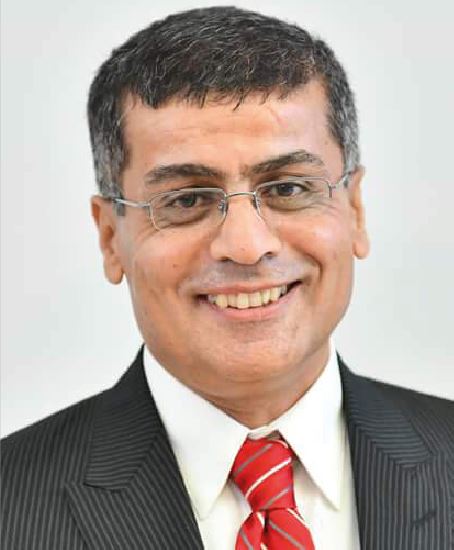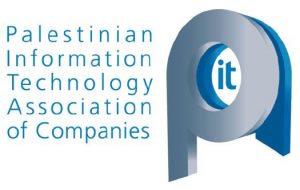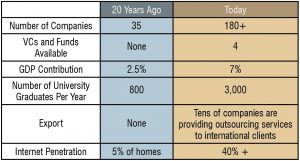The history of the last 20-some years of IT development in Palestine overlaps with the history of the Palestine Information Technology Association (PITA), the organization that serves as the voice of Palestinian information, communication, technology, and startup companies. For this reason, we will frame this article around the history and achievements of this organization. Twenty years ago, PITA and most of its member companies showed what can be achieved with little experience and despite a lack of competitive products or strong solutions. Today, PITA has more than 180 members in the West Bank and Gaza that offer their services not only in Palestine but also in the region and beyond; their specializations include software development and services; hardware sales and distribution; telecom, including the mobile operators; Internet service providers; and consultation companies. Twenty years ago, the IT sector had neither an efficient structure nor the leadership to represent and lead the sector. Today, the IT private sector is indisputably represented by PITA and has a wealth of experience with a mature sector that contributes up to 7 percent of the GDP; its rich portfolio of companies provides a wide spectrum of products, services, and intellectual property that ranges from enterprise solutions to banking software and fintech products, mobile applications, health informatics, and government and legal solutions, to name just a few. Furthermore, PITA member companies are providing and exporting their service to world-class companies worldwide. Microsoft’s Cortana, the speech-based interface of Microsoft’s mobile operating system, was developed in Ramallah. The Intel Small Business Advantage (SBA) solution, of which Intel was able to sell more than 40 million copies worldwide in one year, was developed and is being maintained by Palestinian engineers. Many other similar projects have been executed by Palestinian software companies to the benefit of Cisco, hp, Fujitsu, Adobe, Nokia, and Oxford University – to name but some. Companies in Chicago and Cincinnati have their development centers in Ramallah and Nablus. A call center in Ramallah provides services to many clients in the United States and in Europe. Hi-tech startups are mushrooming around the country and provide Middle Eastern countries with services in Arabic that range from hotel reservations to real estate profiling and investment assistance, as well as health and medical education. A taxi management and reservation system and service, similar to Uber but for taxis, is gaining ground. A hi-tech smart-meter solution that converts any traditional utility meter into a smart one without changing the meter itself is being designed in Al-Bireh. European-based clients are outsourcing their business processes, back-office data entry, and digitizing work to a company in Gaza. A tech hub in the city Rawabi is gaining recognition day after day, as is the Techno Park at Birzeit University.
Twenty years ago, it was almost impossible for any company, startup or otherwise, to receive or even consider the option of seeking funding. Today, at least four different funds are ready and actively looking for ideas and companies in which to invest. Incubators and accelerators are competing to host entrepreneurs and providing work spaces, mentoring, seed funding, training, and marketing services. Cafés are busy brewing espresso cups and serving young engineers and businessmen and women who are searching for better business opportunities or in the process of starting a new business. The Palestinian ICT Incubator PICTI stands out as the most experienced; it specializes in ICT and is the only incubator that has been operating continuously in both the West Bank and Gaza over the past 14 years. We should note, however, that the number of espresso cups that were brewed is much greater than the number of new businesses established.
ExpoTech technology week, PITA’s main annual activity, is undeniably and unequivocally the premier economic event across all sectors in Palestine. Last September, PITA successfully finished its fifteenth ExpoTech International Conference edition with an emphasis on “Better Future through Innovation.” ExpoTech 2018 featured panel discussions and presentations on the role of innovation to shape the knowledge-based economy; the international cooperation to open new markets leveraging the well-established and well-deserved outsourcing reputation that our companies have earned; the role and status of the telecommunication and Internet infrastructure that Palestine enjoys despite all the challenges and pirating imposed by Israeli illegal penetration and exploitation of the Palestinian mobile market; and the advances of fintech and mobile and blockchain technologies and their challenges and solutions as well. Blockchain technology was explored throughout the ExpoTech conference and featured not only as a technology but also as an opportunity for Palestine to reserve its position as a regional blockchain hub. Expotech 2018 enjoyed an increasing international presence whereby presenters from the United Kingdom, the United States, Argentina, Kuwait, Jordan, the United Arab Emirates, France, Japan, and India were among the conference speakers. “Better Future,” “Smart Palestine,” “Palestine Innovate,” “Smart Cities,” and “Mobility and Cloud” are themes that have been featured in previous ExpoTech conferences and exhibitions.
Today, the ICT sector is recognized as a main player in the Palestinian economy, and PITA plays a strong and active role among the private-sector organizations. It is an active member of the Private Sector Coordination Council, an active member of the board of directors of the Higher Council for Innovation and Excellence, a member of the Export Promotion Council, and a member of the Technical Committee on Financial Inclusion, to name a few. PITA will continue its effort as an umbrella organization of more than 180 specialized companies to promote the ICT sector, aiming towards building a knowledge-based economy, fostering the innovation ecosystem, and opening more markets to our products and services regionally and internationally. We may not be a “startup nation,” but for sure we are a nation with a pool of engineering talents that are hungry and eager to contribute to the international civilization.
To increase support for ICT development and in intense coordination with the Palestinian Investment Promotion Agency (PIPA), PITA has engaged in efforts to approve an ICT-Sector Incentive Package. The incentive package has been put into action and is providing tax incentives for startups and well-established companies based on their human talent as a major asset and investment indicator. Any Palestinian company that invests in research and development and employs new staff may be eligible for tax incentives, a move that aims to increase the company’s employability and innovation. While there have been times when different opinions prevailed, the harmonious relation with the Ministry of Telecom and IT (MoTIT) has proven very effective as well. Thus, the elimination of the 7 percent tax burden that was imposed on the Internet Service Providers (ISPs) is a concrete successful example of such mutual partnership with the MoTIT.





